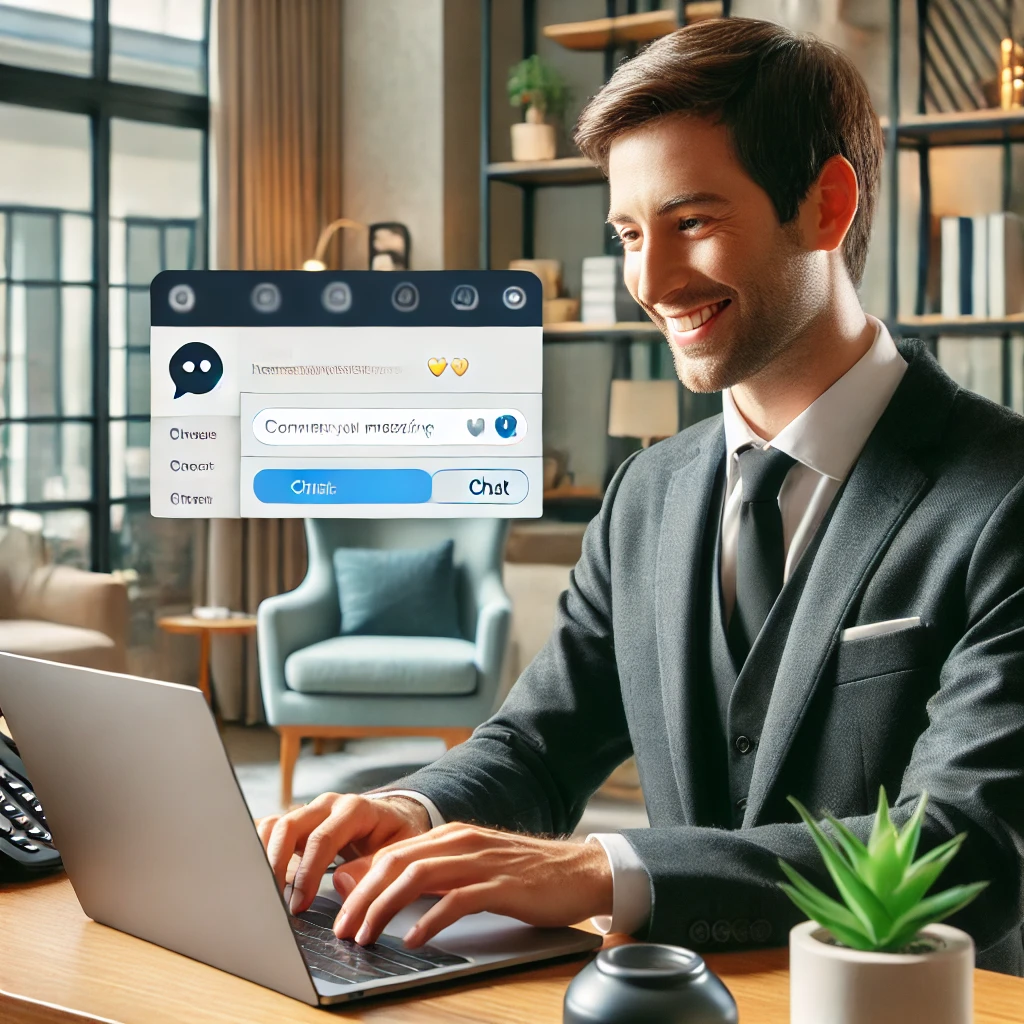
Clear Communication for a Seamless Guest Experience
Ensuring clear communication with your guests is essential for a smooth and enjoyable vacation rental experience. When guests feel informed and supported, they are more likely to have a positive stay and leave glowing reviews. Let’s dive into some practical tips to enhance communication with your guests, making their experience at your property memorable and hassle-free.
Start with a Warm Welcome
First impressions matter, and the way you welcome your guests sets the tone for their entire stay. Send a warm welcome message a few days before their arrival, expressing your excitement about hosting them. Provide detailed instructions on how to get to the property, including any necessary codes or keys. Include a contact number they can reach you on in case they need help during their journey.
Consider creating a welcome packet with information about the property, local attractions, and house rules. This packet can be emailed in advance and printed for their arrival. A friendly, informative welcome message helps guests feel valued and prepared, reducing any pre-arrival anxiety.
Be Prompt and Available
Responding promptly to guest inquiries is a key aspect of clear communication. Whether a potential guest is asking about availability or a current guest needs assistance, timely responses show that you are attentive and reliable. Aim to respond within a few hours, even if it’s just to acknowledge their message and let them know you’ll get back with more details soon.
Set expectations by letting guests know your typical response times and the best ways to reach you. Use messaging apps or platforms that allow for quick and easy communication. If you’re not available 24/7, provide an alternative contact for emergencies. Prompt communication reassures guests that their needs will be addressed swiftly, enhancing their overall experience.
Provide Comprehensive Information
Guests appreciate having all the information they need at their fingertips. Ensure your property listing is detailed and accurate, covering everything from amenities to house rules. Before their stay, send a comprehensive guide that includes check-in and check-out procedures, Wi-Fi passwords, instructions for using appliances, and emergency contact numbers.
Include recommendations for local restaurants, attractions, and activities. Highlight any unique features of your property that guests might not be aware of. By providing thorough information, you reduce the likelihood of confusion and ensure guests can make the most of their stay without needing to reach out for basic details.
Create a FAQ Section
A Frequently Asked Questions (FAQ) section can save time for both you and your guests. Compile a list of common questions and provide clear, concise answers. Include topics like parking instructions, pet policies, and how to operate household appliances. Make this FAQ available in your welcome packet, on your property listing, and through email.
An FAQ section helps guests find quick answers to their questions, enhancing their sense of independence and confidence. It also reduces the number of inquiries you need to respond to, allowing you to focus on more complex issues that may arise.
Check In During the Stay
A quick check-in message after the first night can make a big difference. Ask if everything is going well and if they need anything. This proactive approach shows that you care about their experience and are available to help. Guests might hesitate to reach out with small issues, so this check-in gives them an easy opportunity to voice any concerns.
If guests mention any problems, address them promptly and keep them informed about the steps you’re taking. Even if no issues are reported, guests will appreciate the gesture and feel more connected to you as their host.
Use Technology to Your Advantage
Leverage technology to streamline communication. Automated messages for booking confirmations, check-in instructions, and check-out reminders can ensure that guests receive timely information without you having to manually send each message. Property management software and apps can help manage these communications and keep everything organized.
Consider using smart home devices to enhance the guest experience. Smart locks can make check-ins and check-outs seamless, while smart thermostats allow guests to adjust the temperature to their liking. These technologies not only improve convenience but also reduce the need for direct communication about simple issues.
Encourage Feedback and Act on It
Encourage guests to provide feedback during and after their stay. This can be done through follow-up emails, guest books, or review platforms. Show that you value their opinions by responding to feedback, both positive and negative. Thank guests for their compliments and address any criticisms constructively.
Use feedback to improve your property and guest experience. If multiple guests mention the same issue, take it seriously and make the necessary changes. By demonstrating that you listen and act on feedback, you build trust and encourage repeat bookings.
Personalize Your Communication
Adding a personal touch to your communication can make guests feel special and appreciated. Use their names in messages and reference any special occasions they might be celebrating, such as birthdays or anniversaries. Small gestures, like leaving a birthday card or a small gift, can make a big impact.
Personalized communication shows that you care about your guests as individuals, not just as customers. It enhances their overall experience and makes them more likely to return to your property in the future.
Establishing House Rules for a Smooth Stay
Creating clear and reasonable house rules is essential for ensuring a smooth and enjoyable experience for both you and your guests. House rules help set expectations, prevent misunderstandings, and protect your property. Let’s explore how to craft effective house rules that keep everyone happy and your property well-maintained.
Keep It Simple and Clear
When writing house rules, clarity is key. Use simple language and be direct about what you expect from your guests. Avoid legal jargon or overly complicated instructions. For example, instead of saying, “The lessee shall refrain from producing excessive noise,” you could say, “Please keep noise levels down, especially after 10 PM.”
Break down the rules into easy-to-read sections, and consider using bullet points for readability. This helps guests quickly understand and remember the rules. Clear, concise rules reduce confusion and ensure everyone knows what is expected.
Highlight Important Rules First
Start with the most important rules that affect the comfort and safety of your guests and neighbors. For example, rules about noise, smoking, and parking should be at the top of your list. These rules are crucial for maintaining a pleasant environment for everyone.
For instance, you might write: “No smoking inside the house. You can smoke in the designated outdoor area.” Or, “Please park in the driveway, not on the street.” Prioritizing these rules ensures they catch your guests’ attention and are followed diligently.
Explain the Why Behind the Rules
Guests are more likely to follow rules when they understand the reasons behind them. Briefly explain why each rule is in place. This approach fosters cooperation and helps guests feel more connected to your property’s well-being.
For example, instead of just stating, “No pets allowed,” you could add, “We don’t allow pets to maintain allergy-free spaces for all guests.” This explanation shows consideration for future guests and makes the rule seem more reasonable.
Include Fun and Friendly Reminders
House rules don’t have to be all about restrictions. Add a touch of friendliness and fun to make them more engaging. This helps set a positive tone and shows your guests that you’re not just about enforcing rules but also about ensuring they have a great time.
For example, “Feel free to use the board games in the living room, but please put them back when you’re done.” Or, “Enjoy the barbecue grill in the backyard, but remember to clean it after use for the next guests.”
Address Safety and Security
Safety and security are paramount in any vacation rental. Clearly outline rules that ensure the safety of your guests and the security of your property. For instance, include instructions on how to lock doors and windows, operate security systems, and use any safety equipment like fire extinguishers.
You might write: “Please lock all doors and windows when you leave the house.” Or, “The fire extinguisher is located under the kitchen sink. In case of a fire, call 911 immediately.” Clear safety instructions help guests feel secure and prepared for any situation.
Be Considerate and Respectful
Encourage guests to be considerate of your property and respectful of neighbors. Simple rules about cleanliness and noise can go a long way in maintaining good relationships with your community and keeping your property in great condition.
For example, “Please take out the trash before you check out” and “Keep noise to a minimum after 10 PM to respect our neighbors.” These rules promote a respectful environment and ensure that your property remains welcoming for future guests.
Provide Contact Information for Questions
Ensure that guests know how to reach you if they have any questions or concerns about the house rules. Providing contact information and encouraging open communication can prevent misunderstandings and resolve issues quickly.
Include a friendly note like, “If you have any questions about these rules, feel free to contact me anytime. I’m here to help!” This approach makes guests feel supported and comfortable reaching out if they need clarification.
Reinforce Rules with Visual Reminders
Sometimes, guests may forget the rules during their stay. Reinforce important rules with visual reminders placed strategically around your property. For instance, a small sign near the thermostat reminding guests to turn off the air conditioning when they leave or a note near the front door about locking up can be very helpful.
Keep these reminders polite and unobtrusive. They serve as gentle nudges to help guests remember the rules without feeling like they are being constantly monitored.
Review and Update Regularly
House rules should not be set in stone. Regularly review and update them based on feedback from guests and your own observations. As new situations arise or as you make changes to your property, adjust the rules accordingly.
For instance, if you find that many guests are forgetting to take out the trash, you might add a reminder to your welcome packet or provide more detailed instructions. Staying flexible and responsive to feedback helps keep your rules relevant and effective.
Enhancing Your Vacation Rental with Effective Feedback Systems
Creating a seamless feedback system is crucial for the success of your vacation rental. Feedback from guests not only helps you improve but also builds trust and credibility. Let’s explore how to set up an effective feedback system that benefits both you and your guests.
Encouraging Honest Reviews
Encouraging guests to leave honest reviews is the first step in building a robust feedback system. Make the process as easy as possible for them. Send a friendly reminder a day after their stay, thanking them for choosing your property and inviting them to share their thoughts. You can say something like, “We hope you enjoyed your stay! Your feedback helps us improve and better serve future guests. Please take a moment to leave a review.”
To make it even simpler, provide direct links to your listing on review platforms like Airbnb or Google. Guests are more likely to leave a review if the process is straightforward and convenient. By actively encouraging reviews, you not only gather valuable insights but also increase your property’s credibility and appeal to potential guests.
Responding to Feedback Promptly
Responding to feedback, both positive and negative, is essential. When guests leave positive reviews, thank them for their kind words and express your happiness that they enjoyed their stay. A simple, “Thank you for your wonderful review! We’re thrilled you had a great time,” can go a long way in showing appreciation.
Negative feedback, on the other hand, should be addressed promptly and professionally. Apologize for any inconvenience and explain how you plan to rectify the issue. For example, “We’re sorry to hear about the issues you faced. We’ve taken steps to ensure this doesn’t happen again.” This shows future guests that you are responsive and committed to continuous improvement.
Implementing Feedback for Improvements
Collecting feedback is only valuable if you act on it. Take the insights you gain from guest reviews seriously and use them to make tangible improvements to your property. If multiple guests mention that the kitchen could use more utensils, invest in a complete set. If several reviews highlight the need for better Wi-Fi, upgrade your internet service.
By implementing changes based on guest feedback, you show that you value their opinions and are dedicated to providing an excellent experience. This not only improves your property but also encourages repeat bookings and positive reviews.
Creating a Feedback Loop
A feedback loop ensures that you consistently receive and act on guest input. This can be as simple as setting up a system to regularly review and analyze feedback. Keep track of common themes and prioritize issues that need immediate attention. Schedule regular updates to your property based on this feedback.
Additionally, communicate with your guests to let them know that their feedback has led to positive changes. For example, “Thanks to your suggestions, we’ve added more kitchen utensils and improved our Wi-Fi!” This not only makes guests feel heard but also shows future guests that you are proactive and responsive.
Utilizing Technology for Feedback
Leverage technology to streamline your feedback system. Use property management software that includes built-in feedback and review tools. These platforms can automate the process of requesting reviews and collecting feedback, making it easier for you to manage and respond.
Consider setting up automated emails or messages that remind guests to leave a review. These can be personalized to maintain a friendly tone while ensuring that no feedback opportunities are missed. Technology can also help you analyze feedback trends and identify areas for improvement more efficiently.
Highlighting Positive Feedback
Don’t be shy about showcasing your positive feedback. Highlight great reviews on your website, social media, and listing platforms. Create a testimonials section where you can feature quotes from happy guests. This not only boosts your credibility but also helps potential guests feel more confident in booking your property.
For example, you might post on social media, “We’re delighted by this lovely review from a recent guest!” with a snippet of their positive comments. Sharing positive feedback publicly demonstrates your commitment to guest satisfaction and builds trust with future guests.
Seeking Direct Feedback During the Stay
Encourage guests to provide feedback during their stay, not just after they leave. This can help you address any issues immediately and enhance their experience. Leave a note in the welcome packet inviting guests to reach out if they need anything or have suggestions.
You can also send a mid-stay message checking in with guests. A simple, “We hope you’re enjoying your stay! Please let us know if there’s anything we can do to make it even better,” can prompt guests to share their thoughts. This proactive approach shows that you care about their experience and are ready to assist.
Using Feedback for Marketing
Positive feedback can be a powerful marketing tool. Share testimonials and high ratings in your marketing materials to attract new guests. Include quotes from satisfied guests in your property description and promotional content.
For example, “Our guests love the spacious living area and stunning views! ‘The perfect getaway with all the comforts of home,’ says a recent guest.” Using real feedback adds authenticity and can make your marketing more compelling.
Effective Problem Resolution in Your Vacation Rental
Handling problems efficiently is crucial to maintaining a positive guest experience in your vacation rental. Issues can arise, but how you address them makes all the difference. Let’s dive into some strategies for effective problem resolution that will keep your guests happy and your property running smoothly.
Stay Calm and Listen
When a guest contacts you with a problem, the first step is to stay calm and listen carefully. Whether it’s a minor inconvenience or a significant issue, your calm demeanor will help reassure the guest. Let them explain the problem fully without interruption, showing that you are attentive and concerned about their experience.
Acknowledge their frustration and apologize for any inconvenience they’ve experienced. A simple, “I’m sorry to hear that you’re having this issue,” can go a long way in making the guest feel heard and understood. This initial response sets a positive tone for the resolution process.
Respond Quickly and Efficiently
Time is of the essence when resolving guest issues. Respond to complaints or problems as quickly as possible. Let the guest know you’re taking their concern seriously and will address it promptly. This quick response can often mitigate the guest’s frustration and show your commitment to their comfort.
For example, if a guest reports that the Wi-Fi is not working, respond immediately and provide troubleshooting steps. If the issue cannot be resolved remotely, arrange for a technician to visit as soon as possible. Keeping the guest informed about the steps you’re taking can also help manage their expectations.
Provide Clear Solutions
Once you understand the problem, offer clear and practical solutions. If the issue is something you can fix immediately, do so. For problems that require more time, explain the steps you’ll take and provide a timeline. Be transparent about what guests can expect and follow through on your promises.
For instance, if a guest complains about a broken appliance, you could say, “We’ll have a technician out today to repair it. If it can’t be fixed quickly, we’ll replace it.” Providing clear solutions helps reassure guests that their concerns are being addressed.
Follow Up
After resolving the issue, follow up with the guest to ensure they are satisfied with the solution. A quick check-in message or call shows that you care about their experience and are committed to making things right. It also gives the guest an opportunity to voice any remaining concerns.
For example, “I just wanted to check in and make sure everything is now working well with the Wi-Fi. Please let me know if you need anything else.” This follow-up can turn a potentially negative experience into a positive one, demonstrating your dedication to guest satisfaction.
Offer Compensation When Appropriate
In cases where the issue significantly impacts the guest’s stay, consider offering compensation. This could be a partial refund, a discount on a future stay, or a complimentary service. Compensation shows that you value their business and are willing to go the extra mile to make up for any inconvenience.
For example, if a guest experiences a prolonged power outage, you might offer, “We apologize for the inconvenience. We’d like to offer you a 20% discount on your next stay with us.” This gesture can help smooth over any negative feelings and encourage repeat business.
Document the Issue
Keep detailed records of any problems and how they were resolved. This documentation helps you track recurring issues and ensures you address the root cause. It also provides a reference in case of future disputes.
For example, if a guest reports a leaking faucet, note the date, the guest’s name, the problem, and the solution. This information can be useful for maintenance schedules and improving your overall service.
Prevent Future Problems
Use the insights gained from resolving issues to prevent them from happening again. Regularly review your problem logs and look for patterns. Address the root causes and make necessary improvements to your property and processes.
For example, if you notice frequent complaints about the air conditioning, schedule more regular maintenance checks or upgrade the system. Preventative measures show guests that you’re proactive and committed to providing a top-notch experience.
Maintain a Positive Attitude
Throughout the problem resolution process, maintain a positive and friendly attitude. Your demeanor can greatly influence how guests perceive the situation and your efforts to resolve it. Stay optimistic and assure guests that you’re doing everything possible to address their concerns.
For instance, “Thank you for bringing this to our attention. We’re on it and will have it resolved shortly.” A positive attitude helps keep the interaction pleasant and constructive.
Learn and Adapt
Each problem is an opportunity to learn and improve. After resolving an issue, take some time to reflect on how it was handled and what could be done better next time. Adapt your strategies and processes based on these insights to continually enhance your guest experience.



